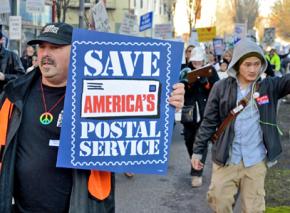Oregon’s fight for postal jobs
An Oregon postal worker reports on actions to protest privatization of the post office.
BY A unanimous vote on May 7, the Oregon House of Representatives sent a message to the U.S. Congress: Protect the U.S. Postal Service (USPS). HJM 15, which calls on Congress to pass the Postal Service Protection Act of 2013, garnered support from every Republican as well as every Democrat in the chamber and is expected to pass the Oregon Senate in like manner.
Oregon Rep. Peter DeFazio and Sen. Bernie Sanders of Vermont are sponsoring the Postal Service Protection Act, which would fix postal finances by refunding the USPS pension surplus, eliminating the pre-funding of retiree health benefits, protecting post offices and mail processing plants, preserving delivery standards, and expanding postal products and services.
In the House gallery cheering the vote were activists who a few weeks earlier had been arrested at the Salem mail processing facility, which is located across town from the Capitol building where the legislators meet. "We had to occupy the mail facility to save it," said Jamie Partridge, a retired postal worker. "We trespassed with our banners to protect a community treasure, the constitutionally mandated postal service."

Two Oregon representatives sponsoring HJM 15, Val Hoyle from Eugene and Brian Clem representing Salem, both with mail processing facilities being closed in their districts, waved up at the activists. The two had just given the same speeches on the House floor that they had earlier given at the Salem plant rally, prior to the civil disobedience action.
UNFORTUNATELY, THE dismantling of the USPS continues unabated. Mail sorting machines from the Salem plant began to be removed on April 30, headed north to Portland and south to Medford. In the beginning of May, mail collection times and overnight delivery standards changed throughout Oregon.
Although their plants are not scheduled for closure until later this year, mail from Eugene/Springfield, Bend and Pendleton is already being shipped all the way to Portland (over 100 miles from each city) to be sorted. Mail is being delayed one or two days.
Since July, the USPS has closed 114 mail sorting facilities, one-third of the nation's mail processing capacity, eliminating 70,000 jobs. Despite a "no layoff" provision in union contracts, at least 40 workers in the Salem plant have lost their jobs, according to local union officials. Twenty-eight were forced into early retirement, and 20 postal support employees "lost their hours." Over 60 other workers were "excessed" to Portland or other facilities.
At least 18 of these union postal jobs will be subcontracted to Matheson Flight Extenders, according to union leaders in Portland. Twelve mail handler positions and six clerk positions will be filled by low wage, non-postal, non-union workers at Matheson, which owns a warehouse next to the USPS Portland Air Cargo Center (PACC).
Postal management states that the PACC cannot hold all the machines from Salem, so they must moved into the private facility. They claim that union workers are too expensive and subcontracting is thus required.
The National Postal Mail Handlers Union (PMHU) and the American Postal Workers Union (AMPU) contracts do not prohibit subcontracting, requiring only that "the employer will give due consideration to public interest, cost, efficiency, availability of equipment and qualification of employees when evaluating the need to subcontract" and "the employer will give advance notification to the Union."
Further subcontracting has hit postal truckers in the Portland area. Faced with understaffing and extensive overtime, the USPS decided to contract out about 20 tractor-trailer routes to Dill Star Trucking, instead of hiring union postal truck drivers. Claiming an "emergency," postal management issued the no-bid contract, sub-leased postal trailers to Dill Star, and put APWU-represented postal truckers in "short" trucks, with many on stand-by for up to six hours. Again, the APWU contract does not protect against such subcontracting.
Portland activists view this piecemeal privatization of the postal service with alarm. The local chapter of Communities and Postal Workers United (CPWU) has secured a pledge by some of Oregon's congressional delegation to meet with postal management, demanding a cost-benefit explanation for the "consolidations" and privatization.
The Salem, Springfield, Bend and Pendleton plant closures will eliminate approximately 300 local union jobs, delay Oregon mail delivery and disproportionately affect small businesses, the elderly, rural communities, the one-half of the public that pays bills by mail and the many who lack access to reliable internet service.
The USPS's own studies have revealed that big mailers leave the system as a result of such delays, costing more in lost revenue than is saved by lowering labor costs, not to mention the dramatic increase in trucking costs as mail is transported hundreds of extra miles to be sorted in Portland or Medford.


